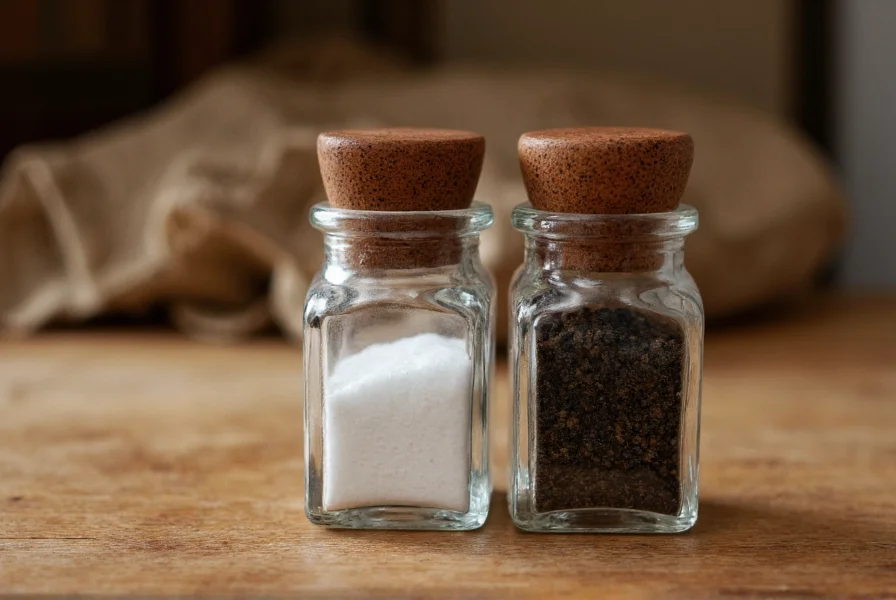When people ask how old is salt and pepper, they're usually surprised to learn these common kitchen staples have dramatically different origins. Salt predates human existence by billions of years, while pepper entered human history much later but still ancient times. Let's explore the fascinating historical timeline of these essential seasonings that now sit side by side on nearly every dining table worldwide.
The Geological Age of Salt
Salt isn't something humans invented—it's a natural mineral compound (sodium chloride) that formed during Earth's creation approximately 4.5 billion years ago. As oceans developed, they became saturated with dissolved salts from weathered rocks. Over millions of years, geological processes created massive salt deposits through evaporation in ancient seabeds.
Some of the world's oldest salt deposits, like those in Germany's Salzkammergut region, formed during the Permian period about 250 million years ago. These deposits became accessible to early humans who discovered salt's preservative properties and essential role in biological functions.
Human History with Salt
While salt existed long before humans, our relationship with it began approximately 6,000 years ago. The earliest evidence of salt production comes from northern China around 6000 BCE, where people boiled saltwater to extract the mineral.
Ancient civilizations quickly recognized salt's value:
| Civilization | Time Period | Salt Significance |
|---|---|---|
| Ancient China | 6000 BCE | First documented salt production |
| Ancient Egypt | 2800 BCE | Used in mummification and as currency |
| Roman Empire | 500 BCE-500 CE | Soldiers paid in salt ("salarium") |
| Ancient Africa | Medieval period | Rock salt traded ounce-for-ounce with gold |
The word "salary" derives from the Latin "salarium," referring to the salt rations Roman soldiers received. Salt was so valuable that it literally shaped trade routes, economies, and even sparked conflicts throughout history—a testament to its importance long before pepper entered the picture.
The Historical Journey of Black Pepper
Unlike salt, black pepper (Piper nigrum) is a plant-based spice with a more recent—but still ancient—human history. Native to the Malabar Coast of southwestern India, black pepper has been used for approximately 4,000 years.
The earliest documented evidence of pepper use comes from ancient Indian texts dating to 2000 BCE. By 1000 BCE, Indian merchants were trading pepper along established routes. When Alexander the Great reached India in 327 BCE, his soldiers brought pepper back to Europe, introducing this "black gold" to Mediterranean civilizations.
During the Roman Empire, pepper became so valuable that it was often used as currency and stored in royal treasuries. The famous Roman cookbook Apicius (1st century CE) contains numerous recipes featuring pepper, demonstrating its established place in elite cuisine.
When Did Salt and Pepper Become a Pair?
While both seasonings have ancient origins, they didn't become the iconic duo we know today until much later. During medieval Europe, salt was common but expensive pepper remained a luxury item reserved for the wealthy.
The pairing gained prominence during the Renaissance when European exploration made pepper more widely available. By the 17th century, as global trade expanded, salt and pepper shakers began appearing together on European dining tables. The iconic matching shakers became standard in American dining during the Victorian era, cementing their partnership in culinary history.
The Enduring Legacy of These Essential Seasonings
Understanding how old is salt and pepper reveals their profound impact on human development. Salt enabled food preservation, which allowed civilizations to grow beyond subsistence farming. Pepper drove global exploration, with European powers sailing across oceans seeking direct trade routes to India.
Today, we take these seasonings for granted, but their historical significance remains immense. The phrase "worth his salt" and the concept of a "peppery" personality both trace back to these substances' cultural importance throughout human history.
Frequently Asked Questions
When did humans first start using salt?
Archaeological evidence shows humans began extracting and using salt around 6000 BCE in northern China. Ancient Egyptians used salt for mummification as early as 2800 BCE, and it became a vital trade commodity across numerous ancient civilizations.
Where was black pepper first discovered?
Black pepper (Piper nigrum) is native to the Malabar Coast of southwestern India. The earliest documented use dates to 2000 BCE in ancient Indian texts, and it was traded along established routes throughout Asia long before reaching Europe.
Why was pepper so valuable in ancient times?
Pepper was extremely valuable because it grew only in specific regions of India, making it difficult to obtain elsewhere. Its preservative qualities, medicinal uses, and ability to enhance flavor created high demand. During the Roman Empire, pepper was literally worth its weight in silver, and medieval European merchants paid exorbitant prices for it.
How did salt and pepper become paired together?
Salt and pepper became paired during the Renaissance period as global trade made pepper more widely available. By the 17th century, European dining tables began featuring both seasonings together. The practice became standardized in American dining during the Victorian era when matching salt and pepper shakers became common household items.
What's the difference between salt's geological age and pepper's historical age?
Salt is a mineral compound that formed during Earth's creation approximately 4.5 billion years ago through geological processes. Pepper, however, is a plant-based spice that humans have used for only about 4,000 years. This fundamental difference explains why salt predates human existence while pepper entered human history much later.











 浙公网安备
33010002000092号
浙公网安备
33010002000092号 浙B2-20120091-4
浙B2-20120091-4